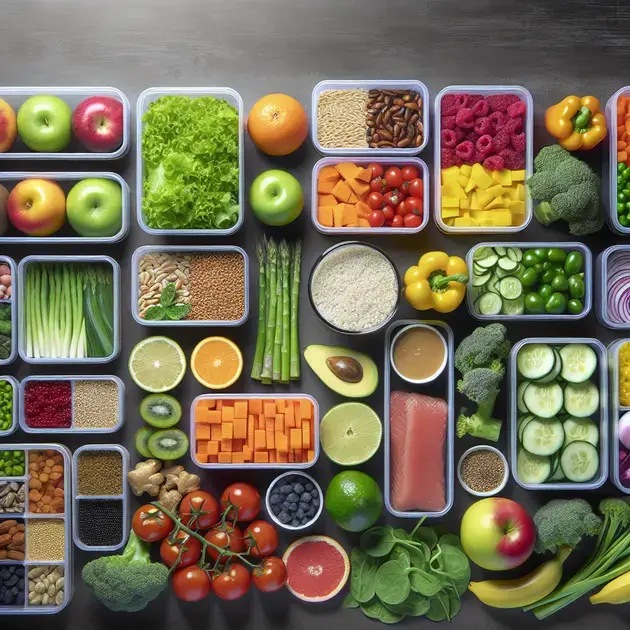Unlocking the secret to food and weight loss can be a challenging journey for many individuals. With the overwhelming amount of information available, it’s easy to get lost in the sea of fad diets and quick fixes. However, understanding the fundamentals of nutrition and creating sustainable habits is key to achieving long-term success in maintaining a healthy weight.
Recent studies have shown that incorporating whole, nutrient-dense foods into your diet can have a significant impact on weight loss and overall well-being. By focusing on real foods that nourish your body, rather than processed products filled with sugars and preservatives, you can unlock the secret to reaching your health goals and feeling your best.
Understanding the Fundamentals of Nutrition for Long-Term Success
Nutrition plays a crucial role in achieving long-term health and well-being. To understand the fundamentals of nutrition for success, it is essential to focus on consuming a balanced diet that includes macronutrients (carbohydrates, proteins, and fats) and micronutrients (vitamins and minerals). Start by tracking your daily food intake using a nutrition app such as MyFitnessPal or Cronometer. These apps allow you to set nutritional goals, track your progress, and ensure you are meeting your daily requirements.
Next, educate yourself on the importance of portion control and mindful eating. Use resources like the USDA ChooseMyPlate website to learn about recommended serving sizes for different food groups. Additionally, consider consulting a registered dietitian who can provide personalized nutrition advice based on your individual goals and needs.
Focus on incorporating a variety of whole, unprocessed foods into your diet, such as fruits, vegetables, whole grains, lean proteins, and healthy fats. Meal prep and planning can help you stay on track with your nutrition goals. Use meal planning apps like Plan to Eat or Mealime to streamline the process and make healthy eating more convenient.
Lastly, stay hydrated and listen to your body’s hunger and fullness cues. Hydration is key for overall health and can impact your energy levels and metabolism. Pay attention to how different foods make you feel and adjust your diet accordingly to support your long-term success.
The Impact of Whole, Nutrient-Dense Foods on Weight Loss
When it comes to weight loss, focusing on whole, nutrient-dense foods can have a significant impact on your success. These foods are rich in essential nutrients and can help keep you feeling satisfied while supporting your weight loss goals. Start by stocking your kitchen with nutrient-dense options like leafy greens, berries, nuts, seeds, lean proteins, and whole grains.
One effective way to incorporate more nutrient-dense foods into your diet is by meal prepping and planning. Use apps like Prepear or PlateJoy to discover healthy recipes, create meal plans, and generate shopping lists based on your dietary preferences and goals. This will make it easier to stick to a nutritious eating plan and avoid unhealthy convenience foods.
Consider the role of mindful eating in weight loss. Slow down during meals, savor each bite, and pay attention to your body’s hunger and fullness signals. This can help prevent overeating and promote healthier food choices in the long run.
Regular exercise is also important for weight loss and overall health. Combine a diet rich in nutrient-dense foods with a consistent workout routine to maximize your results. Track your exercise progress and set fitness goals using apps like Strava or MyFitnessPal to stay motivated and on track.
Focusing on Real Foods for Health Goals and Well-Being
Real foods, also known as whole foods, are minimally processed and provide a wide range of essential nutrients that support overall health and well-being. By focusing on real foods in your diet, you can optimize your nutrition, energy levels, and immune function.
Start by incorporating a variety of colorful fruits and vegetables into your meals. These foods are packed with vitamins, minerals, and antioxidants that promote good health. Use grocery shopping apps like Flipp or Out of Milk to find deals on fresh produce and plan your meals around seasonal fruits and vegetables.
Choose whole grains over refined grains whenever possible. Whole grains like quinoa, brown rice, and oats are high in fiber and can help support digestive health and regulate blood sugar levels. Look for whole grain options in the bread, pasta, and cereal aisles at your local grocery store.
Include lean proteins such as chicken, fish, tofu, and legumes in your diet to support muscle growth, repair, and overall satiety. Apps like Fooducate or ShopWell can help you make informed choices when selecting high-quality protein sources at the supermarket.
Reduce your intake of added sugars, salt, and unhealthy fats by cooking more meals at home using fresh ingredients. Apps like Yummly or Allrecipes provide a wealth of healthy recipe ideas for breakfast, lunch, dinner, and snacks that prioritize real, whole foods for optimal health goals and well-being.
**
The Role of Mindful Eating in Achieving Sustainable Weight Loss
**
Mindful eating is a practice that involves paying full attention to the eating experience, including the taste, texture, and aroma of food, as well as the sensations that arise in the body during and after eating. By practicing mindful eating, individuals can develop a better understanding of their hunger and fullness cues, which can help them make more informed and intentional food choices. This heightened awareness can lead to a more balanced and sustainable approach to weight loss.
When it comes to achieving sustainable weight loss, mindful eating plays a crucial role in helping individuals establish a healthy relationship with food. Instead of viewing food as simply a source of pleasure or fuel, mindful eating encourages individuals to consider the nutritional value of the foods they consume and how those choices impact their overall well-being. By taking the time to savor each bite and truly appreciate the nourishment it provides, individuals can cultivate a deeper sense of gratitude for the food they eat.
Furthermore, mindful eating can also help individuals identify and address emotional or environmental triggers that may contribute to overeating or unhealthy eating habits. By approaching meals with a sense of mindfulness and awareness, individuals can better understand the root causes of their eating behaviors and develop strategies to overcome challenges that may arise during their weight loss journey.
Overall, the practice of mindful eating offers a holistic approach to achieving sustainable weight loss by promoting a deeper connection with food, fostering a greater sense of self-awareness, and empowering individuals to make more conscious and healthful food choices.
**
Exploring the Connection Between Gut Health and Food Choices
**
The health of our gut plays a critical role in our overall well-being, as it is responsible for digesting food, absorbing nutrients, and supporting a strong immune system. The foods we choose to consume have a direct impact on the health of our gut, influencing the balance of beneficial bacteria and contributing to overall gut function. By making mindful and informed food choices, individuals can support optimal gut health and promote overall wellness.
Research has shown that a diet rich in fiber, fruits, vegetables, and fermented foods can help nurture a healthy gut microbiome, leading to improved digestion, reduced inflammation, and enhanced nutrient absorption. These food choices not only support gut health but also contribute to better overall health and well-being.
In contrast, a diet high in processed foods, sugar, and unhealthy fats can disrupt the balance of bacteria in the gut, leading to inflammation, digestive issues, and compromised immune function. By being mindful of the foods we consume and choosing those that nourish and support our gut health, we can optimize our digestive system and promote a healthy microbiome.
By exploring the connection between gut health and food choices, individuals can gain a deeper understanding of how the foods they eat impact their overall health and well-being. Making informed choices that prioritize gut health can lead to better digestion, improved nutrient absorption, and enhanced immune function, ultimately contributing to a healthier and more vibrant life.
**
Maximizing Energy Levels Through Nutrient-Rich Food Choices
**
When it comes to maximizing energy levels, the foods we consume play a key role in fueling our bodies and providing the nutrients needed for optimal performance. By choosing nutrient-rich foods that are high in essential vitamins, minerals, and antioxidants, individuals can support their energy levels and enhance overall vitality.
Foods such as fruits, vegetables, whole grains, lean proteins, and healthy fats are all excellent sources of energy-boosting nutrients that can help sustain energy levels throughout the day. By incorporating a variety of nutrient-dense foods into their diet, individuals can provide their bodies with the fuel needed to stay alert, focused, and energized.
In contrast, foods high in refined sugars, unhealthy fats, and processed ingredients can lead to energy crashes and feelings of fatigue. By prioritizing nutrient-rich foods and minimizing the consumption of empty calories, individuals can stabilize their energy levels and maintain a consistent supply of fuel for their bodies.
By making conscious and intentional food choices that prioritize nutrient density and energy-boosting properties, individuals can maximize their energy levels, improve their overall well-being, and support their body’s natural vitality and resilience.
Conclusion
Considering the role of mindful eating in achieving sustainable weight loss, it becomes evident that this practice goes beyond just food consumption; it encompasses a mindful approach to nourishing the body. By being fully present during meals, individuals can better understand their body’s signals of hunger and fullness, leading to informed food choices and a balanced lifestyle that supports long-term weight management.
Exploring the connection between gut health and food choices reveals the crucial link between what we eat and our overall well-being. By opting for a diet rich in fiber, fruits, vegetables, and fermented foods, individuals can cultivate a healthy gut microbiome, fostering improved digestion, reduced inflammation, and enhanced nutrient absorption. Conversely, a diet high in processed foods can lead to gut imbalances and various health issues, emphasizing the importance of mindful food selection for optimal gut function.
Maximizing energy levels through nutrient-rich food choices underscores the significance of fueling our bodies with the right nutrients for sustained vitality. By prioritizing foods high in essential vitamins, minerals, and antioxidants, individuals can support their energy levels throughout the day, ensuring alertness and focus. On the contrary, consumption of foods high in refined sugars and unhealthy fats can result in energy fluctuations and fatigue, highlighting the impact of mindful food decisions on energy stability and overall well-being.

